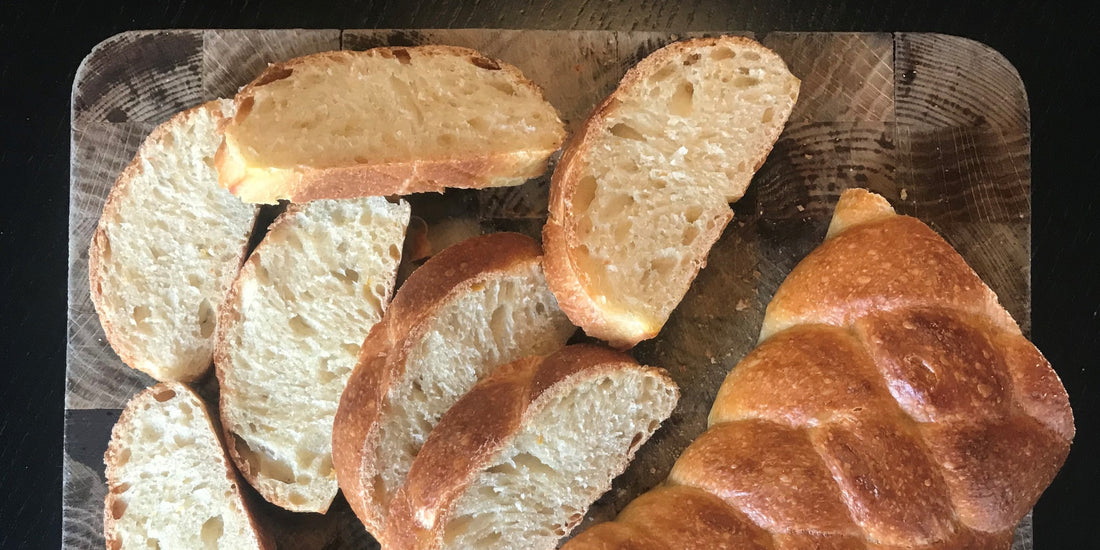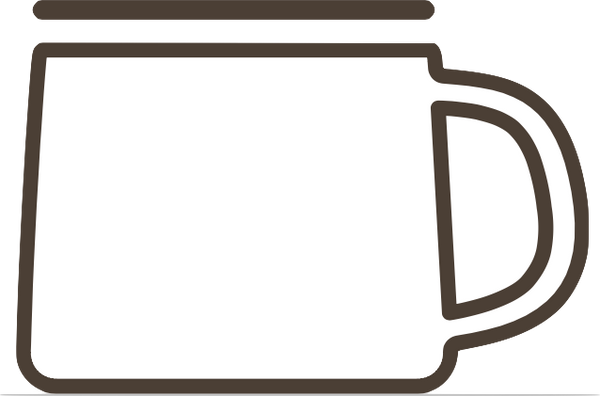
Challah on sourdough
Share
The recipe makes two small loaves
|
Ingredients: white, strong wheat flour, whole grain kamut, light sourdough, egg, orange blossom water, sesame oil, grape seed or sunflower oil, sugar, water, salt, orange peel Tool: Dough tray, dough spatula, mixer |
Time consumption: Sourdough is refreshed and left to stand. 2-6 hours Dough is mixed, kneaded and raised for 7 hours Bake for 30 min. |

If you have followed some of my recipes here on the blog, you have probably seen that my background is varied with roots in France, Algeria and here in Denmark. Maybe you've stumbled across my name too (except for the two times I've been pregnant, the very first thing I've been asked by people I meet for the first time has always been where my name comes from). The name is Jewish and my father's family fled to France from the war in Algeria in the early 1960s. How I ended up here in Denmark is another story. This is about my grandmother, who was a God-given cook. She was, like so many others at the time, a stay-at-home mom, and her existence mostly unfolded in the kitchen of the corner house in Asnières, a suburb north of Paris. From here I have some of my best childhood memories among the scent of spices as warm as her hands.
The Jewish day of rest, Shabbat, starts on Friday afternoon and lasts until sundown on Saturday, and in my very strict practicing family, the day of rest means no work whatsoever , not even cooking. So my grandmother was BUSY on Friday morning, because the whole house had to be cleaned and food for two days to be prepared - because yes: you ate hot food for both lunch and dinner. One of the most important components of the Shabbat dinners was the bread: a brioche-like, light wheat bread, which, unlike brioche, was not baked in butter but in oil, as according to the kosher rules you cannot mix meat and dairy products. And for the New Year's holiday, the bread had to be extra fine, so here she added both sugar and orange blossom water. I LOVED that bread. And I loved the moment when we gathered around the big round table, when the men came home from the synagogue, and my grandfather broke the bread, dipped it in salt and tore off a piece for each of us and one for "the guest who might come «.
Of course, my grandmother didn't use sourdough - it was all too time-consuming to cook for a large family, I think. She used dry yeast, because fresh yeast is not exactly something you find in the supermarket in France: here it is completely ingrained that the daily bread is something you buy from the baker. I have sometimes managed to bake a reasonably successful challah on fresh yeast. But since I first tried my hand at sourdough brioche, I thought I should try baking it on sourdough. It took me a few tries, but now I think the result was good enough for me to be familiar with it. Rest assured, it will NEVER be the same as my grandmother's. But that's probably how it's always going to be, right? Well, but since it can't do that, I've also taken the liberty of replacing some of the fine, white flour with whole grain kamut, simply because it tastes terrific and gives a nice bite.
Ingredients:
- 450 g white, strong wheat flour, e.g. Type xx
- 50 g whole wheat kamut flour
- 100 g very fresh, light sourdough*
- 2 eggs (corresponding to approx. 100 gi in total, so if the eggs are very small/large, adjustments must be made)
- 1-2 tbsp. orange blossom water (depending on the nature of your taste buds – can also be omitted entirely if you find it too perfumed. But give it a shot, because it doesn't taste as strong as it smells )
- 10 g sesame oil
- 30 g grapeseed or sunflower oil
- 20 g of sugar
- 150 g of hand-warm water - 25 g of this is retained
- 9 g of salt
- Grated orange peel from 1 orange
- Beaten egg to brush the breads and possibly a little sesame to sprinkle over
Course of action:
- Refresh your sourdough (see note below)
- Mix all the wet ingredients (except a little of the water), eggs and sugar and beat well; then dissolve the sourdough in the water. Add the flour and stir well until all the flour is wet. It can be a bit difficult, because it gives a rather firm dough. So take any use your hands, but do not knead.
- Let the dough rest for half an hour.
- Add salt, the last water and the orange peel. Maybe a little more water needs to be added during the kneading - it depends on the nature of the flour. But unlike normal sourdough baking or brioche baking, which is the type of bread most reminiscent of challah, care must be taken not to make the dough too wet: It is bread that must be shaped/braided and baked free-standing, and if the dough becomes too wet, it will be a flat round without markings from the braid (if you throw yourself into these kinds of fun exercises). Buttom line: this is actually the hardest part, because if the dough is too dry, yes, then the crumb will be dull and hard, but if it is too wet, you have to give up baking the loaves free-standing and instead slam them into moulds.
- Knead the dough well. As I said, it should end up being firm but silky smooth - and here it really pays to go for the best quality flour. Use possibly a mixer.
- Leave the dough to rise gently for a couple of hours: it won't rise very much and that's just as it should be.
- Divide the dough in half and form them into loaves. You can throw yourself into more or less balanced braid forms - I myself like the four-strand round and elongated braids. I can recommend that you spend some time geeking this out on youtube - it's really impressive what you can create from small works of art.
- Leave the loaves to rise warm on a baking sheet for 3-4 hours, or until they just bounce back lazily when you poke the dough. Again: it depends on the temperature of your kitchen and the activity of your sourdough. When you can sense that it is almost there, heat the oven up to 190 degrees - not on hot air.
- Brush the loaves, place them in the middle of the oven and throw a small cup of water into the bottom to create a little steam. Let them bake for approx. 30 minutes, or until they have just the golden color you like best. However, be careful not to bake them for too long, because then the crumb will become dry.
Bon appetit, and send my little grandma a loving thought if you like the nice challah.
Revka El Baz
*I am usually very little dogmatic about refreshing my sourdough. But just like this and other "sweet" breads, it pays to be a bit particular. Discard all but a teaspoon of the sourdough and freshen it up with lukewarm water and quite a bit of white flour until you have a fairly firm dough. The consistency must be such that you can just stir it well with a spoon. And then it's just a matter of being over it like a hawk, because the bread dough must be mixed when the sourdough peaks exactly. Depending on how lively your sourdough culture is and how hot you set it, it takes between 2 and 6 hours. At this stage it is finely frothy, and it both smells and tastes completely and utterly mild and floral; it must not start to taste sour at all. Don't worry, it can easily make the dough rise anyway. And if it's a slightly older and very sour lady you've been standing there in the glass, you might as well make a double refresher before you throw yourself into the challah baking. Then you are at least completely sure that the bread will not taste sour at all. Which is precisely the idea of the maneuver: to use sourdough instead of yeast, because it gives a deeper taste of grain, but without getting the sensation of decidedly sourdough bread.

